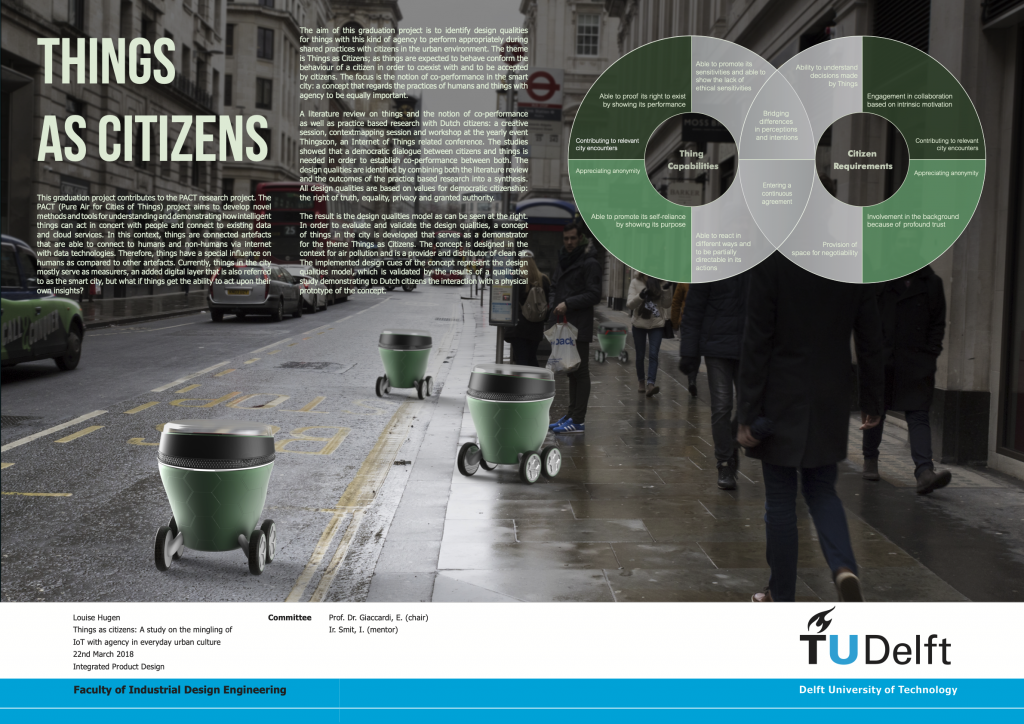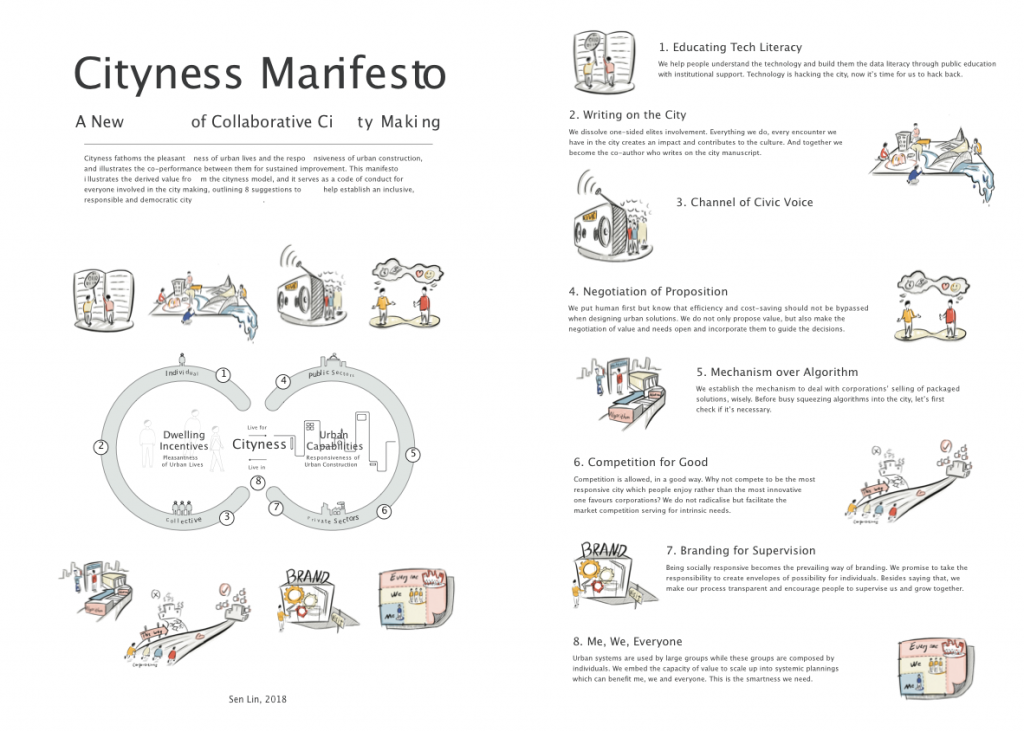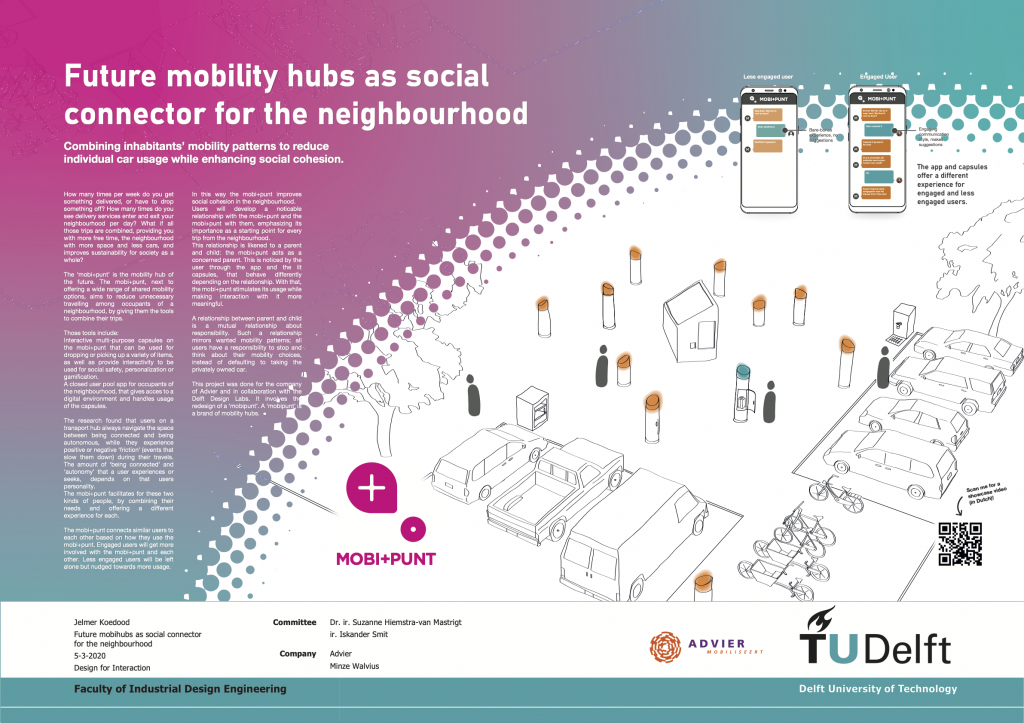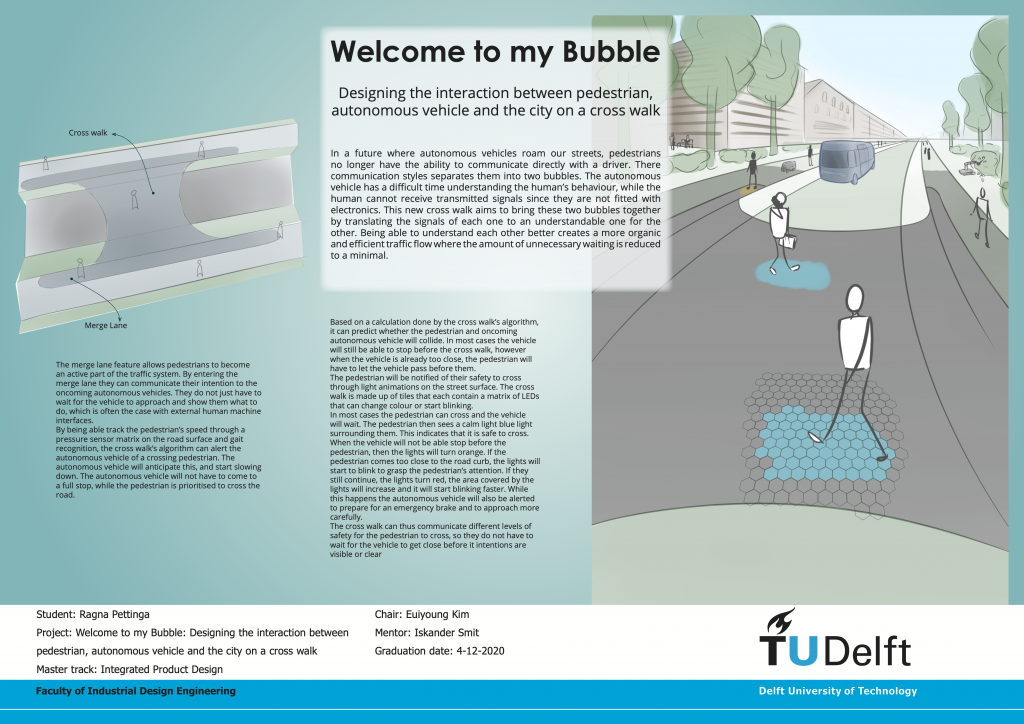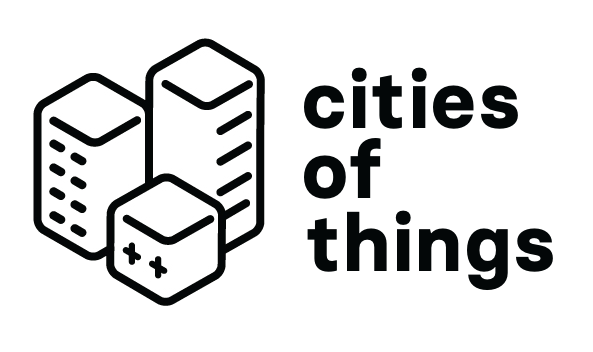With the increasing role of AI and IoT the things we use are becoming intelligent and get autonomy and agency. The relation of humans and nonhumans change and new challenges for designers and policymakers appear. Cities of Things is gathering knowledge from research and practice and translate this knowledge into applicable methods and tools. We work closely together with research programs in different research institutes and universities, and also commission and perform our own research.
Three different lenses
We defined three themes within the cities of things that create a different lens on the topic.
- Acting Cities of Things focuses on the intelligent things, the objects that will get more agency, that are connected and cater new types of services. The lens is the object.
- Adapting Cities of Things focuses on the built environment of the city that is adapting to new intelligent things and objects populating the city. How does the city infrastructure change and work together with the objects in providing these new services?
- Interacting Cities of Things focuses on the relation between the human and nonhuman citizens in the city. What does change in the interactions as the objects become more intelligent, even start predicting?
The research projects commissioned within the cities of things context can be labeled according to these lenses.
Research questions
Within these lenses, some specific research questions return.
- how does the agency between human and non-human actors change when we work & live together with intelligent systems?
- how to design trust in the relationship with intelligent systems?
- what is the role of software design principles in the definition of intelligent things?
- what are new governance structures when we live & work together with intelligent systems?
- what can cities of things benefit from dealing with wicked problems like climate change?
Research projects
Through the research activities of postdocs and numerous graduation research projects, we build experience and knowledge on several aspects and domains of the cities of things.
These papers and article have been published as part of the research activities.
- Near Future Cities of Things: Addressing Dilemmas through Design Fiction
- Envisioning and Questioning Near Future Urban Robotics
- The alienating consequences of things that predict (Smit, 2019)
- Designing for calibrated trust (Valentine, Kim, Smit, 2021)
The following papers are related
- Product as Agents: Metaphors for the products of the IoT age (Cila, Smit, Giaccardi, Kröse, 2017)
- Co-performance: conceptualising the role of artificial agency in the design of everyday life (Kuijer & Giaccardi, 2017)
- Robot citizenship, a design perspective (Lupetti, Bendor, Giaccardi, 2019)
Near Future Cities of Things: Addressing Dilemmas through Design Fiction (paper)
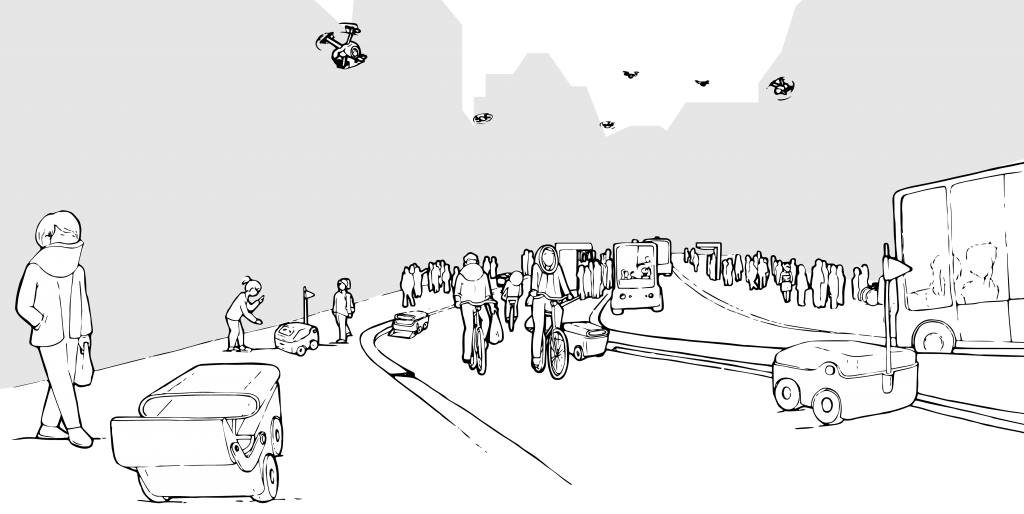
In 2018 we (Maria Luce Lupetti, Nazli Cila, Iskander Smit) wrote a paper where we set out the concept of Things As Citizens through sketching some scenarios for possible future city companions. The abstract:
The smart city infrastructure will soon start to include smart agents, i.e., agentic things, which co-exist and co-perform with human citizens. This near-future scenario explores the flexible types of collaborations and relationships between human and nonhuman citizens. Drawing on current technology forecasts and AI/robotics literature, we created five fictional concepts for reflecting on themes we deem important for such collaborations: responsibility, delegation, relationship, priority, and adaptation. The promises, challenges, and threats of these themes are discussed in this paper, together with the new questions that were opened up through the use of design fiction as a method.
Find the full paper here: https://dl.acm.org/doi/10.1145/3240167.3240273
Envisioning and Questioning Near Future Urban Robotics
Lupetti and Cila developed a workshop format that was tested at ThingsCon 2018. In this paper the workshop and results are described.

Robotic services, which have started to appear in urban environments, are going to transform our society. Designers of these robots are not only required to meet technical and legal challenges, but also address the potential social, political, and ethical consequences of their design choices. In this paper, we present a workshop format with its related tools intended for enabling speculation about such possible futures and fostering reflection on potential socio-ethical implications that might support/oppose these futures. We report the results and discussion of one particular workshop case, in which the implementation of two particular robotic services for a city was envisioned and questioned, i.e., surveillance and delivery of goods. By discussing the results, we illustrate how such a workshop format might be beneficial for setting the agenda for a more conscious design of urban robots and orienting future research towards meaningful themes related to the emerging coexistence scenarios between citizens and robots.
Find the full paper via Researchgate.
Research through student projects
Several minor projects of partnering Universities of Applied Sciences have been themed on Cities of Things research:
- Final minor Master Digital Design of Amsterdam University of Applied Sciences; Kiko, the bike as partner
- Teams WeConnect and WePredikt of Rotterdam University of Applied Sciences
- Eight teams Designing Connected Experiences bachelor elective Industrial Design Engineering TU Delft on design with predictive knowledge.
The master research projects have been linked to building fundamental knowledge and applications in the near future. An overview of the projects:
- Things As Citizens by Louise Hugen
- Hinting Civic Futures by Sen Lin
- Mobility hub of the future by Jelmer Koedood
- Social travel experience in Sea Bubble by Ilse van Zeumeren
- Responsible digital technologies in public spaces by Siddharth Daswani
- Design for a calibrated trust for acceptance of autonomous vehicles by David Valentine
- Design of a living as a service platform including shared mobility by Xueyao Li
- Designing the interaction between pedestrians, autonomous vehicles and the city at a crosswalk by Ragna Pettinga
- ‘everydAI – An AI assistant supporting balance between work and personal activities to increase wellbeing in the home office‘ by Jim Unterweger
- ‘Mobility hubs, how will they function, look and enrich the city?‘ by Jip Schelling
- ‘Design for fluent boarding of a SeaBubble‘ by Meike Kuiper
- ‘Towards an active predictive relation by hacking study of vacuum robot’ by Peicheng Guo
- ‘Enhancing affective interaction with multimodal travel companion’ by Yeonju Jeon
- ‘Designing Safe Routes for Sensing Smart Cities’ by Mohamed Fayed (in progress)
